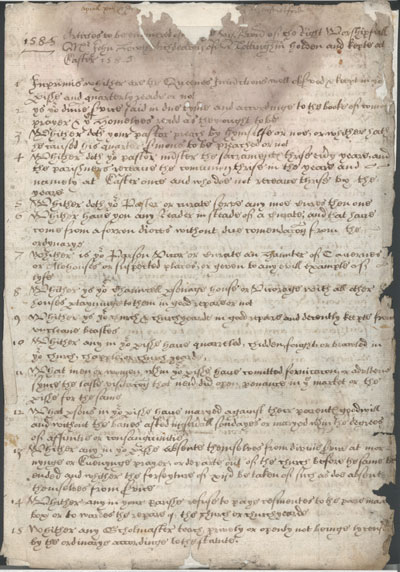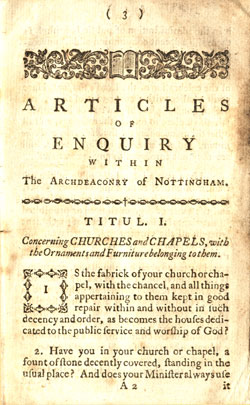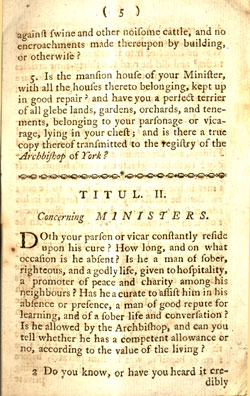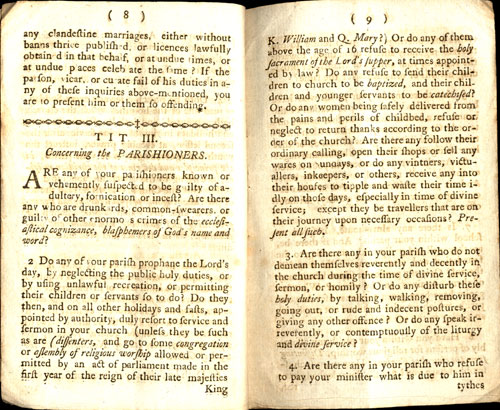Examples of Articles
Presentment Bills were produced by churchwardens in answer to specific articles issued to them in advance of the Archdeacon's regular Visitations. Further details about the full range of offences brought before the Archdeaconry court are available on another webpage.
Although the articles remained virtually the same throughout the 17th and 18th centuries, churchwardens increasingly refused to present their parishioners for most misdemeanours. By the early 18th century, the vast majority of Presentment Bills were answered 'omnia bene', or 'nothing to present', rendering them less informative than the earlier records.
In most cases the articles themselves have not survived. The only contemporary lists of articles present in the Nottingham Archdeaconry archive are dated 1583 and 1585 (AN/V 376/1). The 1585 articles were transcribed and published by A.C. Wood in 'The Nottinghamshire Presentment Bills of 1587' in A Miscellany of Nottinghamshire Records (Thoroton Society Record Series, 11, 1945) pp. 1-42.
However, it is possible to reconstruct the likely questions asked at certain other times, as occasionally the churchwardens refer in their Presentment Bills to the specific titles or numbers of the articles they were answering.
On this page can be found conjectured articles asked of the churchwardens of the Archdeaconry of Nottingham at Easter 1596 and Easter 1663; and an abridged version of original articles issued by the Archdeacon of Nottingham at Easter 1775, which are now part of the Drury-Lowe collection. Answers to numbered articles are also given in the East and West Leake presentment bills submitted at Easter 1733 (AN/PB 323/114 and AN/PB 323/148).

First page of articles issued by Archdeacon John Lowth in 1585 [AN/V 376/1]
Abridged Articles to be answered by churchwardens at Easter 1596
As reconstructed from the answers given in series AN/PB 292/4 and AN/PB 292/5
Concerning the Clergy
1st. Is the minister a licensed preacher and a favourer of God's word and the true religion, and does he follow the order of services in the Book of Common Prayer?
2nd. Are services read on Wednesdays and Fridays?
3rd and 4th. [unknown]
5th. Are the required number of sermons preached in the course of a year, and by whom?
6th. Is the minister resident on his benefice and does he keep hospitality (relieve the poor) there?
7th. Does the minister wear the surplice?
8th. Is the minister honest, sober and decent?
9th. Are the church and chancel buildings in good repair?
10th. [unknown]
11th. Does the minister serve more than one cure, and are they far apart from each other?
12th and 13th. [unknown]
Concerning the Parishioners
14th. [Unknown]
15th. Are there any recusants in the parish?
16th. Are there any parishioners who have not received communion three times in the year?
17th. Are there any parishioners who have not been catechised?
18th-21st. [Unknown]
22nd. Is the schoolteacher (if any) licensed?
23rd. [Unknown]
24th. Are the fixtures and furnishings in the church sufficient and in good order (communion table, bells etc)?
25th. Are there any parishioners who have misbehaved in or misused the churchyard?
26th-27th. [Unknown]
28th. Are there any parishioners who have committed sexual offences?
29th. Are there any parishioners who disquiet their neighbours?
30th. Are there any married persons who live apart from each other unlawfully?
31st and 32nd. Are there any excommunicate persons?
33rd-35th. Financial questions, relating to payment of assessments to the church, payment of clerk's wages, detention of moneys due to the church etc.
36th-40th. [Unknown]
Abridged Articles to be answered by churchwardens at Easter 1663
As reconstructed from the answers given by the churchwardens of Rempstone (AN/PB 316/31) and Kirton (AN/PB 342/1/24)
First section - concerning the church etc.
1st. Are there any decays to the church buildings?
2nd. [Unknown]
3rd. Is there a font decently placed in the accustomed place?
4th. Is there a communion table in good repair and conveniently placed, a carpet for the same, a cup of silver for the wine and a cover for the same, and flagons of pewter?
5th. Is there a decent reading desk and pulpit with a cushion and cloth?
6th. Is there a large common prayer book and a Bible, a book of homilies and canons, a table of degrees wherein marriage is forbidden, a decent surplice and a hood?
7th. Is there a register in which baptisms, marriages and burials are recorded?
8th. Is there a book to record the names and licences of strange preachers, and is there a strong chest with three locks and keys and a box for alms?
9th. Is the churchyard well fenced?
10th. Has a terrier of all glebe lands been delivered to the Archbishop's registry?
11th. Is the parsonage or vicarage house in good repair?
Second section - concerning the parson etc.
1st. Is the minister episcopally ordained?
2nd. Was he legally instituted and inducted?
3rd. Is there anything else to report concerning the minister?
Third section - concerning the parishioners
1st. Are there any parishioners who refuse to come to the public assemblies or public services?
2nd. Are there any parishioners who profane the Lord's Day?
3rd. Are there any parishioners under a common fame of adultery or fornication, or who sow sedition?
4th. Do the parishioners behave themselves in time of divine service, i.e. follow instructions to kneel and stand etc. as in the common prayer book?
5th. Are there any parishioners over the age of 16 who do not come to the Lord's supper?
6th. Are there any parishioners who do not send their children to be baptized?
7th. Are there any parishioners who were unlawfully married?
8th [Unknown]
9th. Are there any parishioners who refuse to pay Easter duties and levies for the repair of the church?
10th. Are there any parishioners who refuse to bury their dead according to the rites of the church of England?
11th. Are there any parishioners keeping conventicles (illegal religious meetings) in private houses?
Fourth section - concerning parish clerks, schoolmasters etc.
1st. Is there a schoolmaster in the parish?
2nd. Is there a parish clerk and are there any parishioners who refuse to pay the clerk the wages due to him?
3rd. Are there any issues concerning the choice of churchwardens?
4th. Is there a sufficient quantity of wine provided at every communion?
Abridged 'Articles to be enquired in the Visitation of the Worshipful Hugh Thomas DD, Archdeacon of Nottingham'
Printed 1775 (De X 3)

First section - concerning churches and chapels, ornaments and furniture

Second section - concerning Ministers
First section - concerning churches and chapels, ornaments and furniture
1st. Is the fabric of the church or chapel, with the chancel, kept in good repair inside and outside, and in decency and order?
2nd. Have you a font of stone, decently covered, standing in the usual place? And does the minister always use it in the administration of public baptism? Is there also a decent communion table, conveniently placed and covered with a fair carpet of silk or other decent stuff in the time of divine service, and with a fair linen cloth at the time of the celebration of the Lord's supper? Is there a chalice with a silver cover, and a flagon and plate of pewter or better metal? Is there a place to receive the offerings and all other things necessary? Are they employed to any common use?
3rd. Have you a large folio Bible of the last translation, two common prayer books and the book of homilies, the book of canons, and the table of degrees allowed or prohibited in marriages? Have you a book of parchment in which all christenings, marriages and burials in the parish are registered? And another of paper for the names of such strangers as are admitted to preach? Have you a convenient reading desk and pulpit, with a pulpit cloth and cushion, and a large surplace and bier for burials? Have you a strong chest with three locks to preserve the books and ornaments of the church, and a box for alms conveniently placed for the relief of the poor?
4th. Is the churchyard sufficiently fenced against swine and other noisome cattle, and no encroachments made thereupon by building or otherwise?
5th. Is the mansion house of the Minister kept in good repair? Have you a perfect terrier of all glebe lands, gardens, orchards and tenements belonging to the parsonage or vicarage, and is a true copy transmitted to the registry of the Archbishop of York?
Second section - concerning Ministers.
1st. Does your parson or vicar constantly reside on his cure? How long, and on what occasion is he absent? Is he a man of sober, righteous and godly life, given to hospitality, and a promoter of peace and charity among his neighbours? Has he a curate to assist him, a man of good repute for learning and of a sober life and conversation? Is he allowed by the Archbishop, and can you tell whether he has a competent allowance or not, according to the value of the living?
2nd. Did the parson or vicar come into his benefice through simony? Was he inducted before sufficient witnesses? Did he read the 39 articles at morning and evening prayer and declare his assent and consent to all things contained in the book of common prayer?
3rd. Does the minister read the common prayer, Litany and commination at the prescribed times? Celebrate the Lord's Supper often enough that all his parishioners receive at least three times in the year, including Easter? Constantly wear the surplice in administration of all offices mentioned in the prayer book? Observe Rogation and Ember days and perform all offices without addition, diminution or alteration? Ready to baptize infants in danger of death? Is any person unbaptized by his default? Does he take care that privately baptized children are afterwards brought to church? Does he observe solemnization of matrimony, visitation of the sick, churching of women and burial of the dead according to the order of the church?
4th. Does he preach a sermon every Sunday or read one of the homilies? Does he often instruct the youth and ignorant people according to the catechism, on Sundays and holidays at evening prayer? Does he read the Act of Parliament against profane cursing and swearing, and His Majesty's proclamation for preventing and punishing immorality and profaneness?
5th. Does he visit the sick when required? Does he bid holidays and fasting days for the following week in time of divine service on Sundays? Does he observe to read the service for 30 January, 29 May, 5 November and 25 October?
6th. Does he make any clandestine marriages?

Third section - concerning the parishioners
Third section - concerning the parishioners
1st. Are any known or vehemently suspected of adultery, fornication or incest? Any drunkards, common swearers or blasphemers?
2nd. Do any neglect public holy duties, use unlawful recreation on the Lord's Day or permit their children or servants so to do? Do they resort to service and sermon on Sundays, holidays and fasts (except for dissenters who go to some permitted congregation or assembly of religious worship)? Do any above the age of 16 refuse to receive the Lord's Supper, or refuse to send their children to be baptized and their children and younger servants to be catechised? Do any women safely delivered from childbed refuse or neglect to return thanks according to the order of the church? Are there any who follow their ordinary calling, open shops or sell wares on Sundays? Do any receive people into their houses to tipple and waste their time idly on those days, especially in time of divine service, except those who are travellers on their journey?
3rd. Are there any who do not demean themselves reverently and decently in the church during divine service, sermon or homily? Or disturb the holy duties, or speak irreverently or contemptuously of the liturgy and divine service?
4th. Are there any who refuse to pay the minister what is due to him in tithes and offerings, or refuse to pay the rates assessed towards the repair of the church or chapel, or for providing utensils or ornaments for the same?
5th. Are there any who have been married without banns or licence? Or married within incestuous or prohibited degrees, or been guilty of fornication before marriage?
6th. Are the seats of the pews well repaired and decently kept? Are the parishioners placed in them according to their degrees and quality, without offence or contention?
7th. Is there an alms-house, hospital or school within the parish? Are they well and godly used according to the intent of the foundation? Is any pension or stipend detained, and by whom? What legacies have been given to pious uses which are withheld and not employed according to the use of the donor?
8th. Are there any dissenting assemblies within the parish, and how many? Are the doors locked, barred or bolted during the time of such meeting?
9th. Do any persons frequenting such assemblies refuse to perform their parochial duties or to pay duties to the church or minister? Do any refuse to undertaken ecclesiastical office if chosen, and if so do they provide a sufficient and allowed deputy?
10th. Does any person presume to erect or alter any seat, stall or pew without licence from the Ordinary?
Fourth section - concerning church officers and other persons.
1st. Do your parish clerk and sexton (if there is one) do the duties of their office obediently and diligently? Are they of honest life and conversation? Is your parish clerk duly chosen by the minister and licensed by the ordinary? Is he aged 20 years and can he read and write?
2nd. Is the schoolmaster licensed by the bishop or ordinary? Is he of honest conversation and is his learning and diligence meet for the office? Does he or any other person instruct or teach youth in any private house or family, not being licensed?
3rd. Does any person practise physic or surgery or midwifery, being not licensed by lawful authority?
4th. Are your churchwardens and sidemen chosen according to the canons? Did the former churchwardens give up their accounts, are they allowed, and did they deliver up the monies remaining in their hands and other things which belong to the church, parish or parishioners?
5th. Do the churchwardens and sidemen see that during divine service on Sundays and holidays no person gives any disturbance in or about the church?
6th. Are the articles of the visitation, the offices of public prayer, mandates and injunctions delivered by the Apparator or his substitutes to other messengers? What fees have they taken for their delivery? Have any summoned any person wrongfully or made false returns? Have they received any money for concealing offences or offenders? Have they threatened to prosecute any one unless they were bribed to desist? Have they carried themselves dishonestly in any respect?
7th. Do you know of any matter or crime of ecclesiastical cognizance fit to be reformed, which is not expressed or enquired of in these articles?
1775 Exhortation
The 1775 articles are concluded by an exhortation to the churchwardens, as shown below. The exhortation was apparently largely disregarded by the time these articles were published, as very few offences were in fact reported to the Nottingham Archdeaconry court.
Exhortation
Next page: Examples of offences